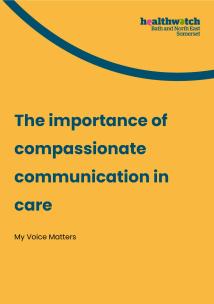The importance of compassionate communication in care

This briefing has been co-written by the widow and family members of Cliff, a retired firefighter with more than 30 years’ service in saving lives, and our Development Officer.
Cliff had a late stage cancer diagnosis in November 2022 and died in December 2022. The family’s concern in sharing their very personal story is to highlight the very real and long lasting impact on the patient and their family when difficult and negative experiences of care and treatment are compounded by communications lacking in compassion. Their hope is that their story will help to ensure that others do not have to go through similar experiences.
The details shared, have been captured through letters and conversations and are the personal accounts of events which ended with the death of a loved one.
Downloads
The Chief Nursing Officer at Royal United Hospitals Bath NHS Foundation Trust said:
"We recognise that Cliff was very unwell when he was in our care and that he had received a devastating diagnosis which had profound consequences for him and for his family. The Trust undertook an investigation into his care and treatment and identified that although his medical treatment was appropriate, the care, support and communication Cliff and his family received could, and should have been much better and for this we are deeply sorry. We are progressing with the improvement actions identified from our review of Cliff’s care and treatment."
Recommendations
These recommendations are intended for hospitals and health providers across the Bath and North East Somerset, Swindon and Wiltshire Integrated Care Board (BSW ICB) area in general, rather than being directed at any specific hospital or ward. They focus on patient experience, and the expectation as set out in a Shared Commitment to Quality that patient experience is given equal weighting alongside patient safety and clinical effectiveness.
- Patients and their families being able to and have the time to ask questions about treatments and procedures should be welcomed and accepted as part of providing a positive patient experience and good healthcare practice.
- Medical practitioners should explain conditions, treatments, procedures and decisions in a clear way and check back that they have been understood.
- Medical practitioners should have compassionate conversations early on, especially where diagnoses of terminal conditions are being shared.
- Medical practitioners and other hospital support services should ensure that information about the range of emotional support available is readily accessible and on offer for patients and their families, especially where patients are facing stressful conditions and terminal diagnoses regardless of ‘clinical’ need for formal mental health support.
- Practitioners should give enough time to explain about ‘DNR’ processes and what this means and allow enough time for patients and their families to understand and ask questions about DNR and to consider their response. They should not feel rushed into making quick decisions if they need more time.

